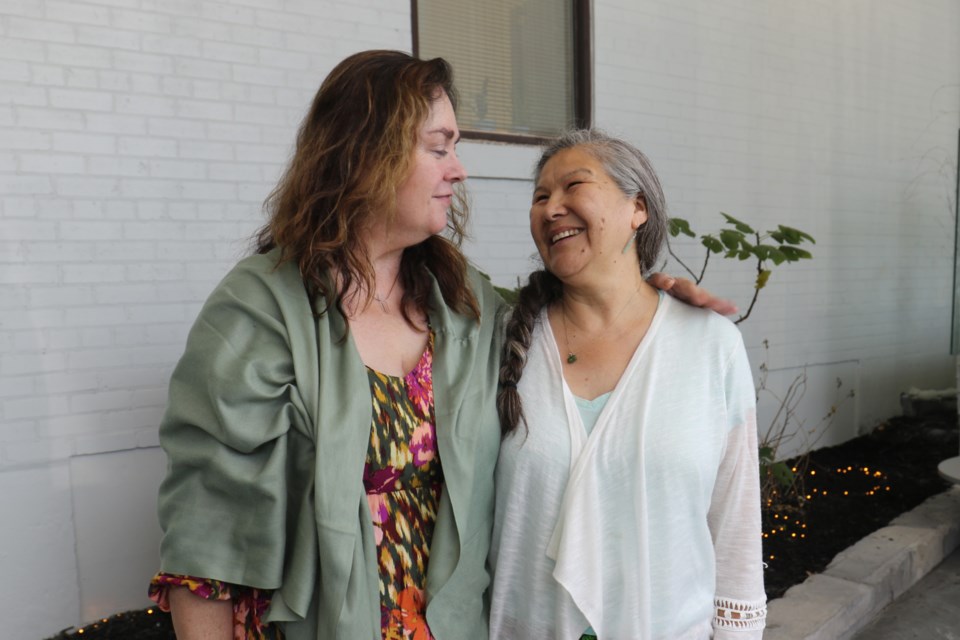The Algoma Community Legal Clinic has been successful in landing grants totalling just over $240,000 from the Ontario Trillium Foundation in order to hire an Indigenous justice program coordinator and build two private offices with videoconferencing capabilities for its clients.
Indigenous community members, legal clinic staff and various stakeholders were joined by Sault Ste. Marie MPP Ross Romano in the main lobby of the Queenscentre building Wednesday afternoon to make the announcement.
Constance Manitowabi has served the legal clinic as its Indigenous justice program coordinator since November. She has a two-year mandate to build bridges between the clinic and Indigenous Peoples within its catchment area of Sault Ste. Marie and the Algoma District.
“When I saw the job posting, I just thought I could do this,” enthused Manitowabi. “It reignited something in me that I’ve had for a long time, so it’s just like, ‘I’m going to pick this up and see where it goes.'
“Particularly, I liked the fact that it was a two-year contract. It gives you a beginning and an end point.”
Manitowabi points to the reception area of the Algoma Community Legal Clinic, where the walls are adorned with pieces of Indigenous art from local artists. She says it’s all part of the legal clinic’s goal of making its offices a more welcoming environment for Indigenous clients seeking free legal advice and representation from the not-for-profit corporation.
“They’re seeing something that’s a part of them happening in the office, and it’s helping people to just feel like they can be there,” she said.
Algoma Community Legal Clinic executive director Nuala Kenny says Manitowabi brings an Indigenous lens to the way her clinic does business, resulting in a “softer place to land” for some of the Indigenous clients in need of legal help.
“She has brought an element of wisdom and understanding to the Indigenous way of life, the Indigenous culture – and she’s not doing it as a box to check,” said Kenny. “She’s braided into it the fabric of our work, she’s braided it into our everyday operations and it has changed the way we do business.”
Romano says the provincial funding used to hire Manitowabi speaks to “moving forward with the work in truth and reconciliation.”
“When you know that there are facts demonstrating an overrepresentation of Indigenous community members that require a lot of the service being provided through the legal clinic, it’s important to be able to bring that case worker perspective that Constance brings into it to be able to show a lot of the Indigenous background, a lot of the elements of truth and reconciliation that we’re trying to work forward through in providing those types of additional supports for those clients that are utilizing the services here at the legal clinic,” said Romano following Wednesday’s announcement.
“It’s also helping them on their healing journey as well, and helping them in that truth and reconciliation step moving forward to understand more about their own background and understand more of their own culture and community, and better ways to move forward in their healing.”
Another $40,200 grant from the province has enabled the legal clinic to build two new office spaces, which will host intake sessions while offering clients access to virtual court and tribunal hearings in a more private setting.
“No one comes here because things are going well – people come to us because things are going poorly. So they’re coming and talking about very private, sometimes humiliating aspects of their lives,” said Kenny. “We’re able to have those fulsome conversations with privacy now as a result of those two offices.
“We’re very, very delighted and really grateful to Ross Romano and his government for building those two rooms for us.”
The Algoma Community Legal Clinic, funded through Legal Aid Ontario, leverages its lawyers, community legal workers and support staff in order to address the legal needs of low-income residents throughout the Algoma District.
“When you see someone on the street that is struggling, it could be you or me – it just happens to be that person that day,” Kenny said. “That person that you see struggling on the street is the exact same as you or me, but they’re experiencing great trauma –often, the centre-point of which is poverty.
“We’re not better than people who are poor. We’re just luckier. I urge the community to embrace kindness and turn off judgment.”
